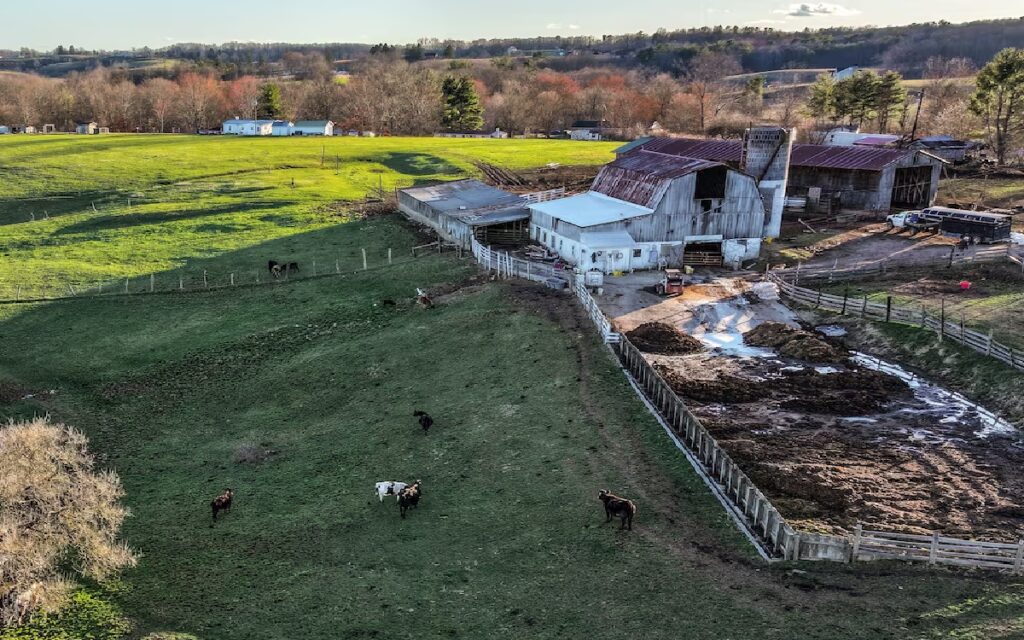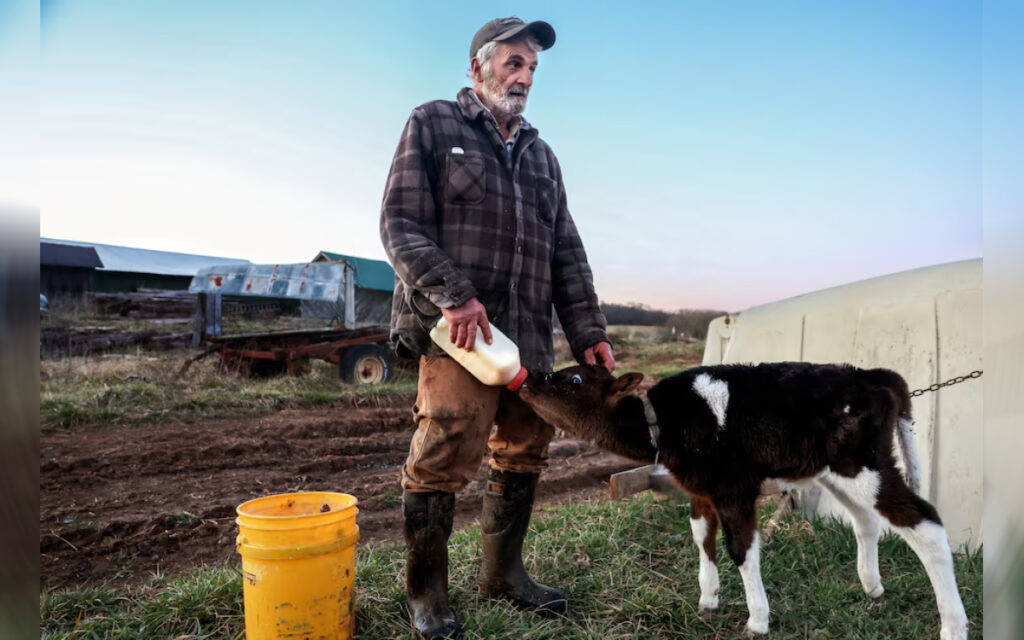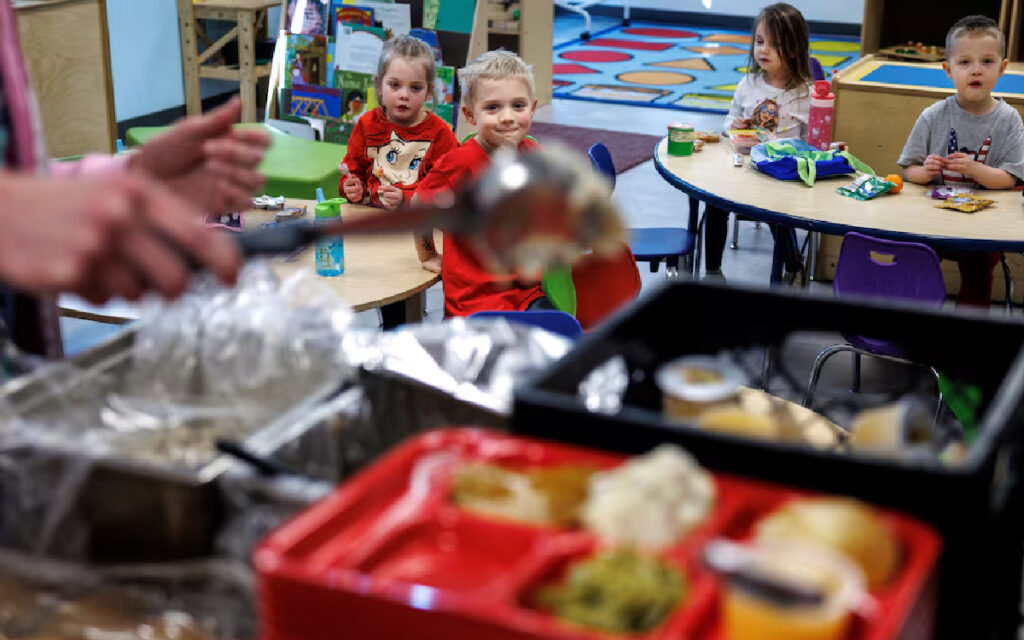Meadow Bridge, West Virginia: The hum of Trey Yates’ butter churn was interrupted by a phone call carrying devastating news. The caller was polite, but the message was clear: Mountaineer Food Bank was terminating its butter contract with Yates due to federal funding cuts.
A day later, President Donald Trump signed a declaration celebrating National Agriculture Day, praising farmers and food producers like Yates. Yet, the cancellation of the federally funded food bank’s contract—a vital source of income—cast a shadow over his business prospects.
At just 27 years old, Yates faced an uncertain future. His heart pounded as he called his father, John Yates, struggling to comprehend how Trump’s administration could take such a drastic step.
“Dad, they’re trying to bankrupt me,” he said. Yates, a registered independent, noted that he had not voted for Trump.

Federal Funding Cuts Hit West Virginia’s Rural Economy
In West Virginia, where Trump secured 70% of the vote in the last election, the administration’s commitment to reducing government spending is now hitting home.
Yates’ lost sales are a direct result of the U.S. Department of Agriculture’s (USDA) cancellation of the Local Food Purchase Assistance Cooperative Agreement Program, which was set to provide approximately $500 million this year to food banks.
Beyond Yates, other small agricultural businesses in the state are feeling the squeeze. Orchard owner Natasha Zoe, a retired Marine, is awaiting grant funds to reimburse her for building a small cannery near Alderson, designed to help local fruit farmers sell syrups and juices. Meanwhile, Johnny Spangler, a blueberry and popcorn farmer in Lindside, expanded operations and bought a larger truck to meet demand—only to see key federal funding disappear.
For decades, an intricate web of federal support has bolstered rural America. Grants from the USDA, Department of Commerce, and Small Business Administration have provided lifelines to small businesses. However, the recent wave of budget reductions—including at least $1.5 billion in USDA funding for schools and food banks—has placed many in financial jeopardy.
“The federal government is the engine of money, while the states are the distributors of money,” said James L. Perry, professor emeritus at Indiana University, who specializes in federal grant administration. “This has become more pronounced as the federal budget has grown.”
With these cuts, states must now either find alternative funding sources or shutter essential programs. West Virginia, where over half of its $19.2 billion annual budget for fiscal 2025 depends on federal funds, faces an especially dire situation.

The Legacy of Federal Pass-Through Funding
For over 200 years, the U.S. government has provided land and monetary grants to state and local governments to encourage national initiatives. These pass-through grants expanded significantly in the 1960s under President Lyndon B. Johnson, whose War on Poverty initiatives increased funding for education, housing, and food security.
Today, these funds enable federal agencies to tap into local expertise while maintaining lean staffing. In fiscal 2024, the U.S. government allocated approximately $1.1 trillion to state and local governments through pass-through grants, accounting for 16% of total federal spending, according to USAFacts’ analysis of data from the Office of Management and Budget and the Treasury Department.
During his campaign, Trump vowed to reduce government waste while supporting American farmers.
“He will ensure farmers have the support they need to feed the world,” said White House Deputy Press Secretary Anna Kelly in a statement to Reuters.
Meanwhile, the USDA is reviewing all programs where payments have been suspended, with Agriculture Secretary Brooke Rollins aiming to make determinations as swiftly as possible, an agency spokesperson stated.
Pass-through grants have been particularly beneficial to agriculture. Programs like the Patrick Leahy Farm to School Grant and the Local Food Purchase Assistance Cooperative Agreement Program (LFPA)—both of which were cut—required funds to be spent on purchases within a certain radius, benefiting local producers. The White House defended the LFPA’s termination, stating that it was a pandemic-era program being phased out.
Overall, federal funds account for about one-third of state budgets, per the most recent U.S. Census Bureau data. Beyond the USDA cuts, a major government spending bill enacted on March 15 resulted in West Virginia missing out on nearly $109 million in requested funding, according to Kelly Allen, executive director of the West Virginia Center on Budget and Policy. Among the affected programs is a $500,000 youth nutrition initiative in Charleston.
The hardest-hit areas include the southern part of the state, where Yates’ business operates and where low-income populations are concentrated, Allen said.

A Multi-Generational Struggle to Keep Farming Alive
Trey Yates’ connection to agriculture runs four generations deep. His butter and cheese nourish local schoolchildren in a region where steady jobs are scarce.
His great-grandfather, grandfather, and father all worked in dairy farming, with his father also employed at a food plant bottling vinegar and apple butter. As a child, Yates marveled at the assembly line as jars rolled out to stores.
His journey into butter-making started in small steps. Supplying schools and food banks seemed like a natural expansion, given their consistent demand. His motivation also stemmed from childhood memories—his mother, Stephanie, would pack extra lunches for classmates in need, and church volunteers delivered peanut butter and jelly sandwiches for the football team.
“Everyone got a sandwich,” Yates recalled. “Some needed more.”
On a recent delivery to Meadow Bridge Regional School, the aroma of freshly baked rolls—made with Yates’ butter—filled the cafeteria. For now, his contract with Fayette County Schools remains intact, thanks to alternative funding secured by the district’s school nutrition director, Andrew Pense. However, other school customers have warned that future purchases could be at risk due to budget constraints.
Also Read | Sentebale Chair Alleges ‘Harassment and Bullying’ by Prince Harry
Financial Pressure Mounts
Even before Trump took office, Yates faced financial challenges. His parents leveraged their home in 2016 to help him acquire a two-story creamery, complete with a butter churn and milk pasteurizer.
He owes money to 68-year-old dairy farmer Mike Fogus, who in 2014 agreed to supply Yates with every drop of his cows’ milk, believing in the young entrepreneur’s vision. Yates’ cows graze on Fogus’ land, but financial strain has created tension between them.
“You gonna get me that check?” Fogus asked during a recent milk pickup. Yates nodded, assuring that payments would be made. He currently has $10,000 in outstanding invoices from schools that have yet to settle their accounts, and about one-third of his school clients have reduced their orders.
“I’m going to pay him back,” Yates affirmed. “The bank, Mike—everyone is going to be paid. If I have to liquidate everything, everyone is going to get paid.”
Also Read | Uganda Finalizes Oil Refinery Deal with UAE’s Alpha MBM Investments
Frustration Boils Over at Town Hall
Yates is not alone in his anger. At a town hall in Beckley, volunteers distributed booklets of the U.S. Constitution and cookies while awaiting responses from Republican officials. Invitations were sent to Senators Shelley Moore Capito and Jim Justice, along with Representatives Carol Miller and Riley Moore, but none attended.
Sen. Capito’s office claimed she had not received a formal invitation but stated she was monitoring federal funding for schools and food banks. Rep. Moore declined to comment, while Rep. Miller and Sen. Justice did not respond.
As attendees expressed frustration, one voice rang out from the back of the room: “They ain’t comin’, are they?”
A volunteer shook his head. Over the next two hours, residents vented their concerns to pictures of absent officials. Hunger was a recurring theme.
Yates, initially hunched over, eventually took the microphone. Speaking without notes, he declared, “They are taking fresh, local foods out of our kids’ mouths and those facing hunger. I’ve never been political, until now. If they need a new face of agriculture in this state, they dug me out of the woodwork.”
The crowd erupted in a mixture of applause, desperation, and hope.



